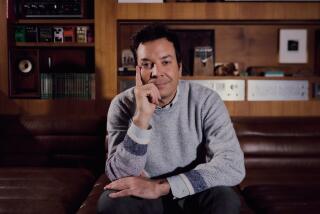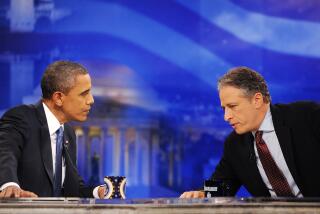It’s a Jungle Out There for Serious News Shows
NEW YORK — In an interview with The Times published days before the Sept. 11 terrorist attacks, “Nightline” anchor Ted Koppel proclaimed himself a realist. What he didn’t realize at the time was that he might also be prescient.
“If nobody watches what we do, if the ratings dry up ... the advertisers will go away, and it won’t be long before the network says, ‘Sorry, Ted, we’re going to put a comedy show in there,’” Koppel said.
ABC did indeed explore whether it could “put a comedy show in there” with its unsuccessful bid for David Letterman. Now, however, with Letterman remaining at CBS, all eyes are on “Nightline” as it fights to retain its place--and justify its viability--in today’s crowded TV news marketplace, including a proposal that would expand the series to an hour per night.
While the journalistic community generally circled the wagons in defense of “Nightline,” some critics grumbled that the show has slipped in recent years. The program initially thrived on a live topic-of-the-day format, sometimes chosen just an hour or two before air time. It took advantage of then-new technology, hooking up guests from all over the globe, then subjecting them to Koppel’s pointed skills as an interviewer.
More recently the show’s sense of urgency has shifted toward mini-documentaries and taped segments that offer more analysis than verbal sparring with Koppel. In addition, the host reduced his workload, regularly anchoring only three nights a week.
“Nightline” executives declined to be interviewed, but they have argued repeatedly that those changes were made to keep the show fresh and to differentiate it from the pack at a time when TV offers more news than ever.
In fact, far from being marginalized by the competitive changes that have occurred, the “Nightline” team envisions expanding its presence, having presented ABC with a proposal late last year--before the Letterman story erupted--to take over the half-hour occupied by the troubled panel-discussion show “Politically Incorrect With Bill Maher.”
Chris Matthews, host of MSNBC’s “Hardball,” is among those who feel “Nightline” has lost its punch. Speaking at a cable industry function last week, he said, “Koppel was great back in the old days when he did, like, Gary Hart interviews.” Letterman, Matthews said in a side-swipe at Koppel’s anchoring schedule, “is live every night.... He doesn’t mail it in. He doesn’t do it with somebody substituting for him.”
“[‘Nightline’] is not irrelevant; it’s allowed itself to become nonrelevant,” said Jeff Gralnick, a former ABC News executive who is now a consultant. The mini-documentaries the show has been offering, he noted, “are good, but they are just not what the audience that ABC needs [to reach] wants.”
The criticisms have stung the “Nightline” team, because most of the changes were made consciously to make the show stand apart from the din of cable news and prepare for the future.
Despite the impression some ABC executives have tried to foster that Koppel works only three days a week, supporters say his schedule is designed to let him work just as hard on other projects, reporting and anchoring six weeklong series per year and two prime-time specials.
Koppel has used that time to examine the Clinton presidency, America’s drug problems, the vastly underreported war in the Congo and a series on gay life that was postponed after Sept. 11 but will air eventually. The show routinely looks at topics most other news programs ignore, such as race relations or, two years ago, the possibility of an anthrax attack.
One longtime industry executive suggested that “Nightline” erred by walking away from topical shows simply because the program can do a better job covering a subject in a half-hour than a cable news channel often does in four hours. After Sept. 11, “Nightline” reverted to a newsier format, but the program’s philosophy remains that focusing on stories everyone else is covering comes at the expense of more complex issues.
Koppel’s revised schedule, under a five-year contract signed in December 2000, was also a deliberate attempt to cultivate a team that could take the show well beyond his tenure. Chris Bury was made the main substitute and the show expanded its credits to include correspondents Bury, John Donvan, Michel Martin and Dave Marash. The thought, executives said, was to make the show more of an ensemble, similar to the crew on CBS’ “60 Minutes.”
Money has been another issue where Koppel’s team has tried to be realistic. To pay for expensive trips such as the one to the Congo, outside partners such as PBS’ “Frontline” have been brought in. “We’re trying to demonstrate [to Disney] that people in the news division get it” about the need to rein in costs, executive producer Tom Bettag has said.
In fact, “Nightline” approached ABC executives long before the recent brouhaha regarding Letterman and proposed taking over the money-losing half-hour occupied by “Politically Incorrect,” which follows “Nightline.” Under the proposal, the first half-hour would remain dedicated to serious news, while the second would be hosted by Koppel and have a softer edge, focusing on more profiles, popular culture and the arts, attempting to appeal to the younger viewers watching TV at that hour.
Part of the pitch to ABC was that the best programming to follow news is news. Moreover, by using facilities already in place for “Nightline,” costs for the second half-hour would be lower than for a show with a separate infrastructure.
Koppel has remained publicly silent other than writing a newspaper commentary about the program’s relevance and issuing a harshly worded statement asking for a stronger commitment from Disney.
In an interview with CNN on Friday, Walt Disney Co. Chairman Michael Eisner hinted that ABC executives were engaged in talks about “what [‘Nightline’] is going to be and how long it is going to be” but didn’t get more specific, saying only, “We would be disappointed if [Koppel] were not at ABC.”
More to Read
The biggest entertainment stories
Get our big stories about Hollywood, film, television, music, arts, culture and more right in your inbox as soon as they publish.
You may occasionally receive promotional content from the Los Angeles Times.










